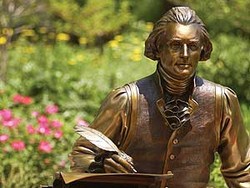Thomas Jefferson Government
|
| updated |
Copy Link Code
|
 For a scholar and polymath such as Thomas Jefferson, beliefs on government were based on an academic understanding of the world that saw natural and social sciences as parallel. Much in the same way the movement of objects could be measured with physics, Jefferson proposed, the interaction of humans could be explained through science. Thus, the basis of Jeffersonian democracy was a belief in the natural rights of all men. Steeped in the lessons of the Enlightenment philosophers, Thomas Jefferson views on government were based on principles of virtue and liberty. The difference between John Locke and Thomas Jefferson, though, is that one was a thinker and one was an actor.
For a scholar and polymath such as Thomas Jefferson, beliefs on government were based on an academic understanding of the world that saw natural and social sciences as parallel. Much in the same way the movement of objects could be measured with physics, Jefferson proposed, the interaction of humans could be explained through science. Thus, the basis of Jeffersonian democracy was a belief in the natural rights of all men. Steeped in the lessons of the Enlightenment philosophers, Thomas Jefferson views on government were based on principles of virtue and liberty. The difference between John Locke and Thomas Jefferson, though, is that one was a thinker and one was an actor.
Thomas Jefferson was not the first man to suggest that "all men are created equal," but as the author of the Declaration of Independence, he made that radical notion a founding principle of American government. During the long debate on the structure of a national government, Thomas Jefferson was a leading anti-Federalist who favored self-governance by the states over centralized power. Thomas Jefferson and James Madison formed the Democratic-Republican Party in 1791 as a united opposition to the Federalist stance of the Washington administration. Jefferson even resigned from his post as Secretary of State in protest. In 1796, Jefferson ran against his old friend and rival John Adams, leader of the Federalists who believed the strength of the United States relied on a mighty and powerful national government. When Jefferson lost, he became the Vice President under the electoral rules of the time. The Adams administration, fearful of a secondary revolution similar to the one in France, instituted the Alien and Sedition Acts to oppress dissent and imprison their political opponents. After Thomas Jefferson defeated Adams in the election of 1800, he promised not to enforce the Alien and Sedition Acts upon the Federalists as they had upon Republicans. In the opinion of Thomas Jefferson, government was supposed to be under constant pressure of rebellion, lest they forget who is really in charge. In his role as President Thomas Jefferson, beliefs on government that he had developed from youth held strong during his time of power. In the vision of Thomas Jefferson, society expressed itself as a whole through democracy and a healthy society would be based on independent communities living mostly in agrarian settings.
The view of Thomas Jefferson on taxes was that they were necessary but should be proportioned to only what a citizen could spare in a given year. He felt strongly that services such as education and defense should be funded by the public but that taxation could easily become tyrannical if citizens were forced to pay for ideas to which they did not adhere. A government big enough, Thomas Jefferson believed, to impose its will upon the people is too big for a safe and proper democracy. For President Thomas Jefferson, foreign affairs would test his revolutionary ideals. As a proponent of liberal revolution, Jefferson preferred to support France in their Napoleonic wars with Britain and provided considerable sums of money through the Louisiana Purchase. The Thomas Jefferson embargo act of Haiti, the second republic in the Western Hemisphere created when African slaves revolted against the French, showed a deeper fear that slaves such as his own might rise in revolt as well. In the grand legacy of Thomas Jefferson, foreign policy was less of a concern as the crisis in France had abated, but he did leave a lesson for future Commander-in-Chiefs with the naval mission to rescue American hostages of the Barbary pirates.
